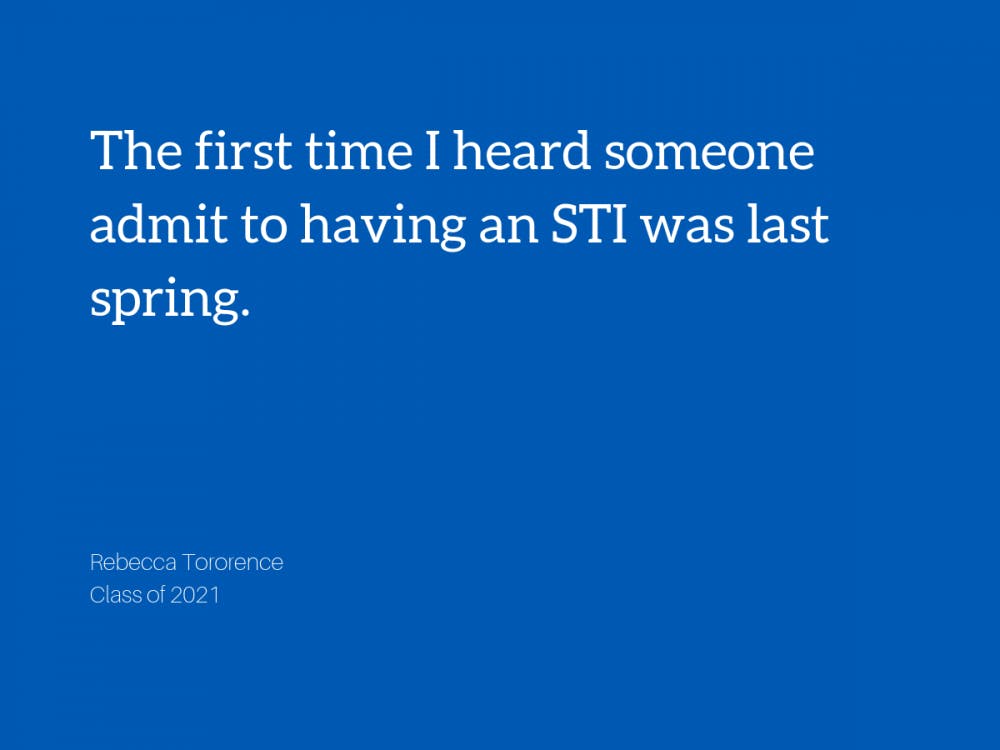The first time I heard someone admit to having an STI was last spring. I was in the dressing room of the Ruby Studio Theater, sitting with the women of All of the Above. Performing our monologues had brought us pretty close—but the candor of their conversation still left me stunned.
“Yeah, I’ve had chlamydia before. And then I took some antibiotics and got rid of it. It was no big deal.”
A couple of other girls acknowledged their own histories with STIs or told stories about their friends’ experiences. I was amazed. Not only were these women brave enough to open up about such a heavily stigmatized topic, but they didn’t dramatize that bravery. They treated a conversation about STIs just like any other conversation—normal.
Our collective unease about STIs rises from a multitude of sources. Many of us were taught about STIs in middle or high school with graphic pictures and fear-inducing language, an effort intended to emphasize the importance of protection. There’s not much data about the efficacy of these strategies, given that many schools still lack adequate sexual education. The point is, I don’t remember any details from those lectures. I don’t remember any statistics about the prevalence of chlamydia or how to treat gonorrhea. I only remember the pictures—and the classroom’s groans of disgust.
Duke offers many sexual health resources, including both STI education and testing. Unfortunately, the apprehension about STIs that we learned to feel in our youth hasn’t dissipated. In the time I spent as a PASH responder last year, I can count the number of students I saw take advantage of our resources on one hand. The free monthly STI tests offered by DuWell or the HIV tests offered by Know Your Status don’t receive much attention, either. This isn’t surprising—these things don’t feel normal to us. They unsettle us because, despite our desire to create a sexually progressive culture, we still won’t talk about our STIs.
Now would be a good time to note that I’ve never had an STI. I know this because I’ve been tested within the past six months and haven’t had any new partners since then. I’ve had conversations with each of my past sexual partners about our statuses, and it’s never been the horribly uncomfortable conversation I assumed it would be.
But if I did ever contract an STI, I suspect I’d feel very alone. That conversation in the AOTA dressing room was not only the first time I’d ever heard someone mention having an STI, it was the only time. Besides those women, I couldn’t name anyone at Duke who has or has had an STI. But I definitely know those people—the statistical probability is far too high to suggest otherwise, with national data indicating that one in two sexually active people will contract an STI by age 25.
So where are they? Where are you, Duke student reading this column who tested positive for HPV last month? Where’s the girl who started presenting symptoms of gonorrhea a few days ago or the boy who doesn’t know how to tell his partner about his STI status? I want to hear from you—we all do. That kind of nonchalant courage is admirable, not least because it has the potential to make a lasting impact on Duke’s sexual health culture, as well as on our own perspectives.
While I believe the Duke community as a whole is ready and willing to have these conversations, I understand that there are many people who fear the stigma that is assumed to accompany STIs. In particular, women often shy away from talking about their STI status for fear of being labeled a slut. This isn’t an unfounded concern—the sexist narratives that dominate popular culture teach us to associate STIs with women who “get around.” But let’s get something straight: A person’s STI status has nothing to do with their character, nor it does it give you an excuse to make assumptions about their life. As my friend Jane so poignantly put it, “Having an STI doesn’t make you a ho. And even if you are a ho—who gives a s***?”
In addition to reducing shame about a person’s STI status, having these conversations can keep you informed in case you ever contract an STI yourself. Did you know you can have chlamydia, gonorrhea, HPV, or herpes without presenting any symptoms? Do you know which STDs can be treated with medicine? Do you know the difference between an STI and an STD? Rather than frantically Googling these questions when you notice a symptom or two, educating yourself could reduce your panic and allow you to treat an STI like any other medical problem.
Having conversations about your STI status may seem uncomfortable or embarrassing, but it doesn’t have to be. The only way to make STIs will seem as normal as they actually are is to talk about them. None of us want this to be a big deal. So let’s pretend it’s not. Until it isn’t.
Rebecca Torrence is a Trinity junior who is fully expecting to receive several texts from friends about their STI status upon this article’s release. Her column runs on alternate Thursdays.
Get The Chronicle straight to your inbox
Signup for our weekly newsletter. Cancel at any time.

